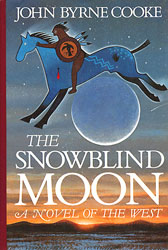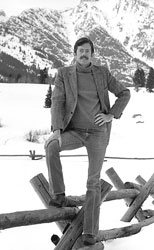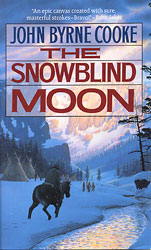Text Selection
Julius entered the kitchen first, holding the door open for the two strangers. Only Hutch and Ling were with Lisa now.
"He's looking for the boss," Julius said.
"We're looking for Jed Putnam," Hardeman said.
"He was my father. I'm Lisa Putnam." She offered her hand and the bearded man took it. She had seen the way his eyes swept the kitchen as he entered, pausing in turn on Hutch and Ling before stopping to rest on her. She met his gaze of frank appraisal longer than he expected, but he did not look away. His hand was strong and warm, recently withdrawn from the glove he held in his other hand.
"Was?" Hardeman was numb, struggling to regain control of his thoughts.
"He died last fall."
"He died?"
"He had a stroke in August. He died a month later." The man was still holding her hand. Lisa withdrew it, feeling an unaccustomed warmth in her face. What was the matter with him? Couldn't he understand a simple thing like that? Her father was dead. For Lisa, the stating of that fact had required an effort of will.
"I'm sorry," Hardeman said, feeling stupid in his inadequacy. He had been on edge ever since entering the warm kitchen. He had glanced briefly at the Chinawoman and the boy--another hired hand by the look of him--and his eyes had come to rest on the young woman in the simple blue dress who said she was Jed Putnam's daughter. She held a coffee cup in her left hand, and in the first moment Hardeman saw her she had the look of someone caught in a secret act.
He glanced around the kitchen searching for signs. Six chairs were pushed back from the sturdy wooden table; another was occupied by the young hired hand. Three chairs stood squarely in place. On the table there were wet rings made by half a dozen cups. The plates and serving dishes from the recent meal were in the galvanized sink, half washed; the sideboards were wiped clean. Even now the Chinawoman straightened two of the chairs and wiped the table with a damp rag.
The signs led Hardeman to a certain conclusion. There were only four people in the kitchen now, apart from himself and Johnny, but there had been more here just a short time ago.
He looked again at those present. The Chinawoman was at the sink, back at her washing up. The boy, a few years younger than Johnny, sat where he had been ever since the strangers entered, looking from one to the other and then at the colored man and Lisa Putnam, waiting for someone to speak.
Beneath the stove a large orange cat stepped out of its basket and crouched on the floor, ready to move quickly should the occasion demand it. The cat's wariness heightened Hardeman's sense of hidden danger.
None of those here lived in the Sioux tipi outside. Who did, and where was he?
Hardeman moved a little to one side so he could see the room's three doors--one to the saloon, one to the outside, and a third that probably led to the back of the house. "I'm sorry," he said again. "I guess that makes you the boss here now."
"Julius was my father's partner. Now he is mine."
Hardeman understood at last what had passed across the Negro's face outside. It was anger at being taken for a hired hand just because he was colored. Still, it was a reasonable guess. Christ, he thought, let there be an end to the surprises here. He contained his annoyance with difficulty. The news of Jed's death had caught him unaware. It was a possibility he had never considered; he had always thought of Jed as immortal.
It was Jed Putnam who had taken young Chris Hardeman in hand in the summer of 1851 and taught him the skills of the the frontier, and after Jed had left the emigrant trails to set himself up in Putnam's Park, Hardeman had heard news of him over the years. And now he had finally come to see his old friend. The Putnam Cutoff was right where it should be and Jed's mountain park was just as Hardeman had always imagined it; approaching the settlement with Johnny, he had felt Jed's presence in every building and shed, in each of the cows down in the meadow. To find that Jed was dead had put him off balance. With an effort he steadied himself now. He would need new allies, and there was no telling which one might prove most valuable. He put out his hand to the colored man.
"I guess I left my manners on the trail. My name is Hardeman; Chris Hardeman. The boy is Johnny Smoker."
Julius hesitated, but he took the hand and shook it. After all, he had concealed old Jed's death for no reason, just some instinct he still didn't understand. "Julius Ingram," he said. "This here is Hutch. The cook is Ling Wo." He saw Hardeman cover a momentary surprise at being introduced to the small Chinese, who nodded politely before turning back to the dishes.
Johnny Smoker scarcely acknowledged Lisa and the others as they glanced in his direction. He stood apart, too far for a handshake. He had seen Chris shift position and had seen the sign Chris made with his hand. It was a small movement known only to the two of them. It said There may be danger.
"You must be hungry," Lisa said. "There's plenty left from dinner. Please sit down." She moved toward the stove to see if the stew was hot, glad of something to do.
"We ate today. We'd be grateful for a cup of coffee." Hardeman unbuttoned his coat, clearing the way to the Colt revolver in his waistband. He moved to the head of the table, choosing a seat where he could face the room. "And some whiskey, if you've got it." He saw the hesitation in Lisa Putnam's movement and the shadow of disapproval that crossed her face, which was as he intended. It was time these people were put off balance now, while he collected himself to prepare his move.


